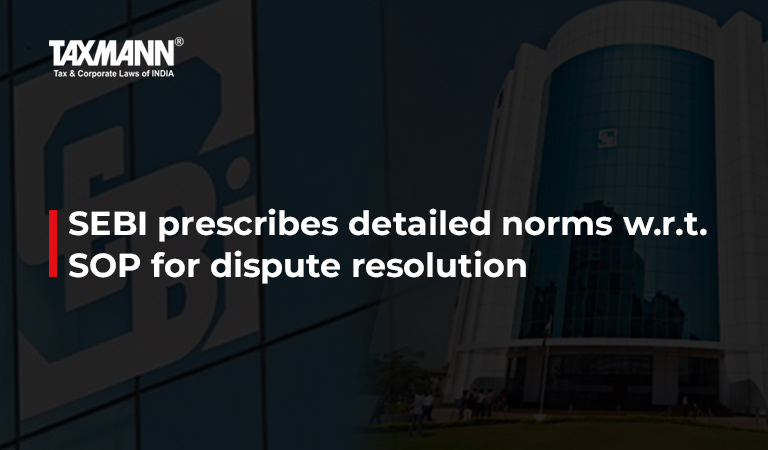SEBI prescribes detailed norms w.r.t. SOP for dispute resolution
- Blog|News|Company Law|
- 2 Min Read
- By Taxmann
- |
- Last Updated on 6 September, 2022

Circular no. SEBI/HO/MIRSD/MIRSD_RTAMB/P/CIR/2022/76, Dated: 30.05.2022
SEBI has prescribed detailed arbitration mechanisms norms w.r.t Standard Operating Procedure (SOP) for operationalizing the resolution of all disputes pertaining to investor services such as transfer/transmission of shares, demat/remat, issue of duplicate shares, transposition of holders etc.
Accordingly, the Arbitration Mechanism shall be initiated after exhausting all actions for the resolution of complaints including those received through the SCORES Portal. Further, the detailed norms w.r.t arbitration, Appellate Arbitration, arbitration fees, an arbitration award, and reporting have also been provided. The circular shall be effective from 01.06.2022
Arbitration
The limitation period for filing an arbitration application shall be as prescribed under the law of limitation, i.e., The Limitation Act, 1963. In case of arbitration matters involving a claim of up to Rs. 25 lakhs, a sole arbitrator shall be appointed, and, if the value of the claim is more than Rs. 25 lakhs, a panel of three arbitrators were required to be appointed. The process of appointment of the arbitrators shall be completed by the stock exchange within 30 days from the date of receipt of the complete application from the applicant.
Appellate Arbitration
Any party aggrieved by an arbitral award may file an appeal before the appellate panel of arbitrators of the stock exchange against such award within one month from the date of receipt of the arbitral award by the aggrieved party. The appellate panel shall consist of three arbitrators who shall be different from the ones who passed the arbitral award appealed against.
Arbitration Fees
The fees per arbitrator shall be Rs. 18,000/- plus stamp duty, service charge, etc. as applicable per case. The fees plus stamp duty, service charge, etc. as applicable shall be collected from RTAs/ Listed companies and shareholder(s)/ investor(s) separately by the Exchange, for defraying the cost of arbitration. If the value of the claim is less than or equal to Rs.10 lakhs, then the cost of arbitration with respect to the shareholders/investors shall be borne by the Exchange.
Arbitral Award
The arbitration proceedings shall be concluded by way of the issue of an arbitral award within four months from the date of appointment of the arbitrators. The stock exchanges may extend the time for issue of an arbitral award by not more than two months on a case-to-case basis after recording the reasons for the same
Record and Disclosures
The stock exchanges shall preserve the documents related to arbitration for five years from the date of an arbitral award, appellate arbitral award or Order of the Court as the case may be and register of the destruction of records relating to the above permanently.
The stock exchanges shall disclose on its website, details of the disposal of arbitration proceedings and details of arbitrator-wise disposal of arbitration proceedings as per the formats prescribed by SEBI for already available arbitration mechanisms.
Click Here To Read The Full Circular
Disclaimer: The content/information published on the website is only for general information of the user and shall not be construed as legal advice. While the Taxmann has exercised reasonable efforts to ensure the veracity of information/content published, Taxmann shall be under no liability in any manner whatsoever for incorrect information, if any.

Taxmann Publications has a dedicated in-house Research & Editorial Team. This team consists of a team of Chartered Accountants, Company Secretaries, and Lawyers. This team works under the guidance and supervision of editor-in-chief Mr Rakesh Bhargava.
The Research and Editorial Team is responsible for developing reliable and accurate content for the readers. The team follows the six-sigma approach to achieve the benchmark of zero error in its publications and research platforms. The team ensures that the following publication guidelines are thoroughly followed while developing the content:
- The statutory material is obtained only from the authorized and reliable sources
- All the latest developments in the judicial and legislative fields are covered
- Prepare the analytical write-ups on current, controversial, and important issues to help the readers to understand the concept and its implications
- Every content published by Taxmann is complete, accurate and lucid
- All evidence-based statements are supported with proper reference to Section, Circular No., Notification No. or citations
- The golden rules of grammar, style and consistency are thoroughly followed
- Font and size that’s easy to read and remain consistent across all imprint and digital publications are applied



 CA | CS | CMA
CA | CS | CMA
